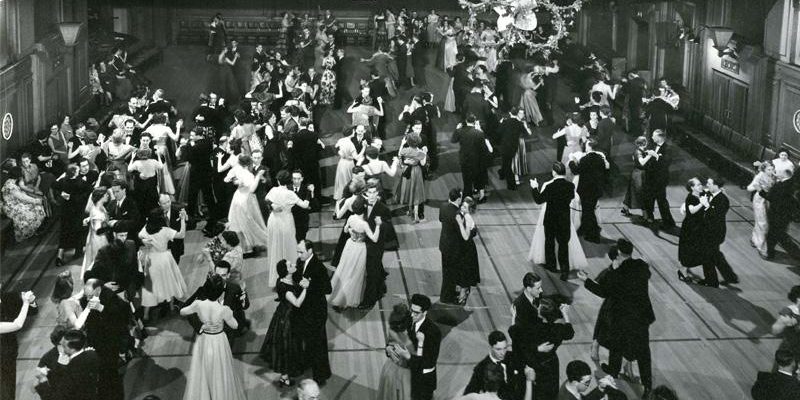Author: Dr Katja Seidel, Senior Lecturer in History, School of Humanities, University of Westminster
‘The crowds of sightseers on the day, … were phenomenal. To all of us there came a sense of unity in our loyalty to and affection for the Queen, and throughout the whole ceremony … there came a sense of spiritual uplift’
Coronation Message from the President, The Polytechnic Magazine, July 1953
This is the enthusiastic message of the President of the Regent Street Polytechnic, the University of Westminster’s predecessor, to students and staff on the occasion of the Coronation of Queen Elizabeth II in June 1953. The coronation of a young, radiant Queen was an important event for the country – and the university. Less than a decade earlier, Britain had emerged victorious from the Second World War. Food rationing was still in place but Britain clung on to its empire – only India and Pakistan had gained independence in 1947. The coronation of Queen Elizabeth II was to reaffirm the much-vaunted war-time unity of the British people and its Commonwealth.
The Regent Street Polytechnic, known as ‘The Poly’ marked the occasion in style, with a Coronation Concert and Dance held in Portland Hall, Little Titchfield Street. Patriotic tunes were delivered, ‘The Three Poly Sisters’ act made an appearance and the concert ended with a rousing rendition of ‘Land of Hope and Glory’ by the British composer Edward Elgar. The concert was followed by ‘refreshments’ and the dance. But did this event involve the student community? It seems not. The concert and dance was a high-brow event that included local dignitaries such as the Mayor and Mayoress of St. Marylebone, representatives of the London County Council as well as the university’s President and staff. In total 500 guests attended giving ‘all those connected with the Polytechnic the opportunity of joyously expressing their loyalty to Her Majesty The Queen on the occasion of Her Coronation.’
A less formal and more inclusive event was the Polytechnic Coronation Fête held on 27 June at Chiswick Sports Grounds. Here staff, students, and members of the Polytechnic Institution (a social and sports club linked to the university) met for sports competitions, children’s entertainment and to enjoy the ‘fun of the fair’. The athletic events on the day took centre stage and included hockey, netball, tennis, fencing, dancing, judo, and athletics competitions. Sports has always taken an important place in the history of the institution, going back to the university’s founder Quintin Hogg and his aim to ‘educate mind, body and spirit’.

(Image: University of Westminster Archives, Coronation Fête Programme, 1953)
But what about the students themselves? Unlike the Poly’s leadership, staff and high society supporters, the students it seems did not pay much attention to the coronation. The student newspaper Student Forum ran a light-hearted cartoon special of the day, depicting a Poly student cartoon character experiencing the coronation and committing all kinds of mischief. Already then Poly students were marked by their diversity, they were a creative, ambitious, and outspoken just like Westminster students are today.

(Images: Westminster University Archives, Student Forum, 11 June 1953)
Interestingly, the two official coronation events of 1953 were modelled on the events the Polytechnic had put on for the coronation of King George VI in 1937. The only difference was that the concert and dance in 1937 was fancy dress with a prize for the best costume (sadly no photographs are available). The coronations in 1937 and 1953 were only 16 years apart. Conventions and forms of sociability in those years were still very similar. The Polytechnic then was firmly in the hands of the Studd family that had made its fortune in India. Sir Kynaston Studd, who was a cricket prodigy of his age, was its president in 1937, his son, Sir Bernard, was the Poly’s president in 1953.
Seventy years on, the University of Westminster is a very different place and Britain a different country. The empire is gone, but we are still grappling with its legacy. We have lived through a pandemic and are struggling with a cost-of-living crisis. A recent survey has shown that the monarchy is less important to people in Britain now. A formal event such as a coronation concert and dance to us seems old-fashioned and outdated. Westminster has had a close relationship with the late Queen who was a patron of the university but the university’s marking of the coronation of King Charles is more low-key and commensurate with the times. In a social media post we are invited to remember the times King Charles visited the university, but it is left to each of us, students and members of staff, whether or not and how we are going to take part in the coronation celebrations. The University of Westminster will be represented at the ceremony in Westminster Abbey on Saturday, 6th May. King Charles has commissioned twelve composers to write new pieces for the coronation service, among them our own Professor of Music, Shirley Thompson OBE .
—–
Author: Dr Katja Seidel is Senior Lecturer in History in the School of Humanities, University of Westminster, where their research is focused on the history of European integration, exploring the historical origins and longer-term developments of EU policies.
- Action learning and coaching: An integrated approach to supporting women’s career progression - December 5, 2023
- The Beauty of Body Fat - May 26, 2023
- Leave Your Ego Outside: Reverse Mentoring With BAME Students & Senior University Leaders - May 18, 2023
